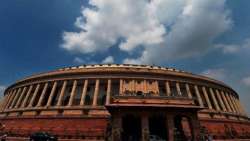Govt plans slew of bills in Monsoon session; Oppn to corner it over Covid management, fuel price
The government has listed 17 new bills for introduction in the session. Three of the bills seek to replace ordinances issued recently. Once a session starts an ordinance has to be passed as a bill within 42 days or six weeks, else it lapses.

The government has readied a big legislative agenda for the Monsoon session of Parliament beginning Monday even as the Opposition seeks to corner the ruling dispensation over its handling of the second wave of COVID-19 and the rise in fuel prices. The government has listed 17 new bills for introduction in the session.
Three of the bills seek to replace ordinances issued recently. Once a session starts an ordinance has to be passed as a bill within 42 days or six weeks, else it lapses.
One of the ordinances issued on June 30, prohibits any agitation and strike by anyone engaged in the essential defence services.
The Essential Defence Services Ordinance 2021 came in the backdrop of the announcement by major federations of the Ordnance Factory Board (OFB) to go on an indefinite strike from the later part of July to protest the government's decision to corporatise the OFB.
The Essential Defence Service Bill, 2021 has been listed to replace the ordinance, according to a Lok Sabha bulletin issued on July 12.
The Commission for Air Quality Management in National Capital Region and Adjoining Areas Bill, 2021 is another measure that seeks to replace an ordinance.
According to the government, the ordinance was brought to provide a permanent solution and establish a self-regulated, democratically monitored mechanism for tackling air pollution in the NCR and adjoining areas, rather than limited ad-hoc measures.
The Opposition on its part wants to corner the government by raising issues like alleged shortcomings in the healthcare system during the second wave of the coronavirus pandemic and the distribution of Covid vaccines to states.
It would also seek replies on the rising prices of petrol diesel and cooking gas during the session which would end on August 13.
According to the financial business listed in the bulletin, there would be a presentation, discussion and voting on Supplementary Demands for Grants for the year 2021-22.
There would also be a presentation, discussion and voting on Excess Demands for Grants for the year 2017-18.
On Saturday, Vice President and Rajya Sabha Chairman M Venkaiah Naidu urged members of Parliament to stand by people amid the pandemic and discuss all issues related to it in the House to address the concerns of the citizens.
Chairing a meeting of leaders of various parties and groups in Rajya Sabha ahead of the session, he also asked the leaders to ensure a smooth and productive session.
"A dysfunctional Parliament adds to the prevailing gloom and hence all sections of the House should ensure a smooth and productive session as it offers an opportunity to address the concerns of the people affected by COVID-19," he told the leaders.
Noting that the second wave of COVID-19 infection sprang several surprises and severely tested India's health infrastructure, Naidu said Parliament is the right forum to get updated about various aspects of fighting the disease and benefit from ground-level experiences of members of the House from different states.
This is important in the context of a possible third wave of infection which is being talked about a lot, he said.
During the session, all Covid-related protocols, which include maintaining social distancing, would be followed. Both the Houses will sit simultaneously.
Amid the pandemic, Rajya Sabha used to earlier sit in the first half of the day, and Lok Sabha in the second half. But from part two of the Budget session in March this year, the two Houses had started sitting simultaneously from their usual timing of 11 am onwards.
According to latest data, 444 members from Lok Sabha and 218 from Rajya Sabha have been vaccinated with at least one dose. The figures may have gone up, officials said.
ALSO READ: BJP-NCP should form govt in Maharashtra, says Ramdas Athawale